Chinese New Year Vocab || 63 Must Know Words and Phrases
Your Guide to All the Essential Chinese New Year Vocab
Learning Chinese New Year vocab is a great way to find out more about Chinese New Year traditions and practices. It is also the perfect opportunity to take the vocab you’ve learned and test it out with Chinese friends, a language partner or in Chinese classes.
If you want to find out more about Chinese New Year apart from just the vocab make sure to have a look at our Complete Guide to Chinese New Year.
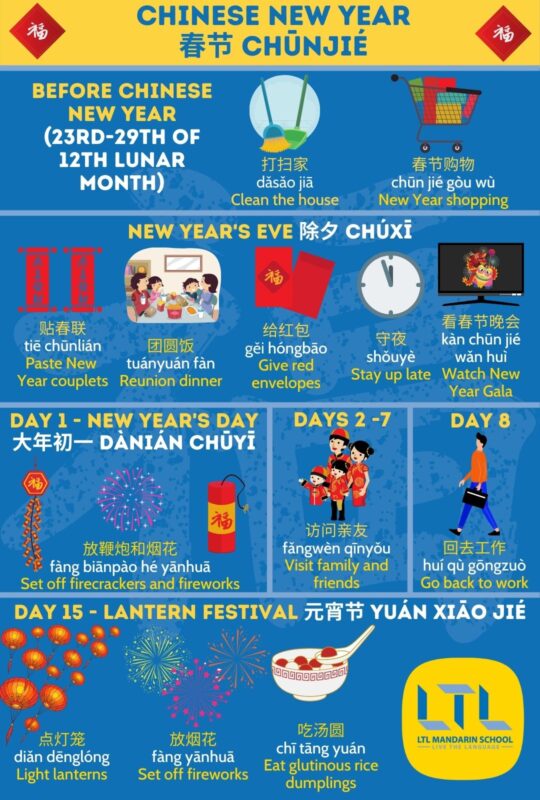
Chinese New Year Vocab || Events and Dates
Chinese New Year Vocab || Greetings and Blessings
Chinese New Year Vocab || Activities, Objects and Decorations
Chinese New Year Vocab || New Year Food
Chinese New Year Vocab || Chinese Zodiac Animals
Chinese Zodiac || Posters
Chinese New Year Vocab || Quiz
Chinese New Year Vocab || Events and Dates
To start off let’s have a look at some of the main events and dates that you should be aware of for Chinese New Year.
You’ll notice that there are actually quite a few ways to say New Year, however the main one is 春节 chūnjié which literally translates to Spring Festival.
| English | Chinese | Pinyin |
|---|---|---|
| Spring Festival (Chinese New Year) | 春节 | chūnjié |
| Lunar New Year | 农历新年 | nóng lì xīn nián |
| Chinese New Year’s Eve | 除夕 | chúxī |
| New Year’s Day | 大年初一 | dànián chūyī |
| Day After New Year’s | 初二 | chūèr |
| Lantern Festival | 元宵节/正月十五 | yuán xiāo jié/zhēngyuèshíwǔ |
| First month of the lunar year | 正月 | zhēng yuè |
| Twelfth month of the lunar year | 腊月 | làyuè |
| Spring Festival Migration | 春运 | chūnyùn |
| Reunion dinner | 团圆饭 | tuányuán fàn |
| Chinese New Year Gala | 春节晚会 | chūnjié wǎnhuì |
| Temple fairs | 庙会 | miàohuì |
| New Years dinner | 年夜饭 | nián yè fàn |
| Celebrate the New Year | 过年 | guònián |
| New Year’s visit | 拜年 | bàinián |
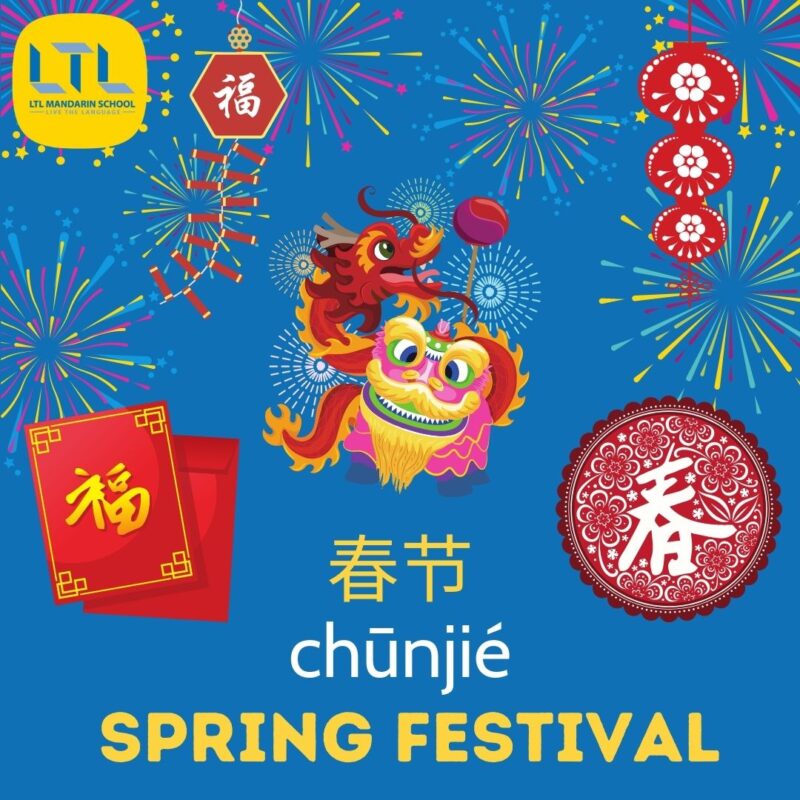
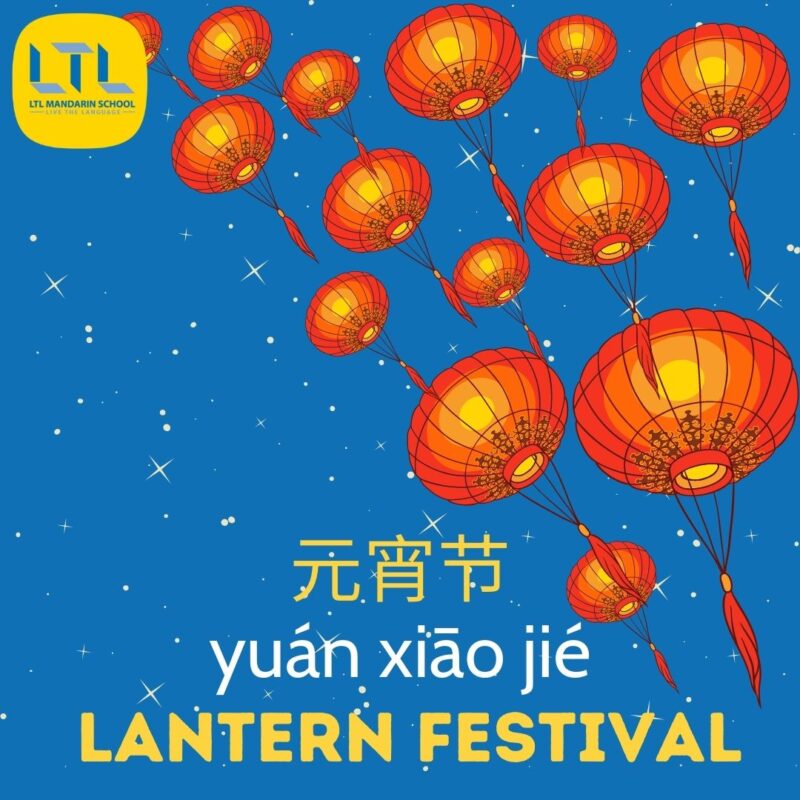
If you’re in Beijing for Chinese New Year, have a look at our list of top things to do below.
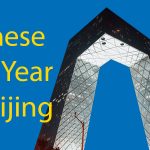
Chinese New Year Beijing ⭐️ Top Things to Do During the Festival 2024
Experience the Magic of Chinese New Year in Beijing: A Guide to Celebrating the 2024 Year of the Dragon Chinese New Year, also known as Spring Festival, is the most important holiday in China, marked by festive celebrations, family reunions,…
Chinese New Year Vocab || Greetings and Blessings
There are many ways to wish someone a Happy New Year in Chinese, along with many greetings and blessings.
Let’s have a look at some of the most common ways.
Happy Holidays – 过年好 guònián hǎo!
As we saw in the last section of Chinese New Year vocab, 过年 guònián means to celebrate the New Year so you simply add 好 hǎo afterwards to wish someone happy holidays.
Happy Spring Festival – 春节快乐 chūnjié kuàilè
If you’ve already learnt how to say Happy Birthday in Chinese, then you’ll know that the word happy 快乐 kuàilè always comes second, opposite to the way it is written in English.
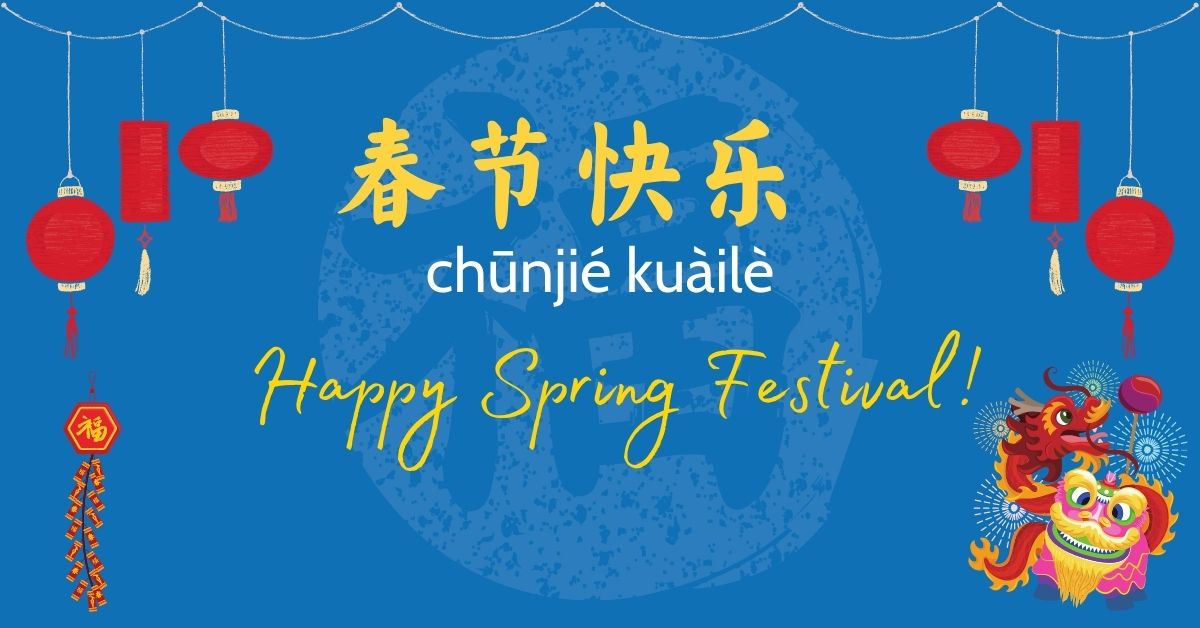
Happy New Year – 新年快乐 xīn nián kuài lè
Another standard New Year greeting, however this one can also be used to wish someone a Happy New Year for the Gregorian calendar on 1st January.
Wishing (You) Good Fortune – 恭喜发财 gōngxǐfācái
This is one of the most popular New Year greetings you’ll hear in China, 恭喜 gōngxǐ are good wishes, or congratulations and 发财 fācái means to become rich of gather wealth.
Children will often follow up 恭喜发财 gōngxǐfācái with the phrase 红包拿来 hóngbāo ná lái which means “may I have my red envelope please?”. This is normally how children will greet their aunties and uncles during New Year visits.
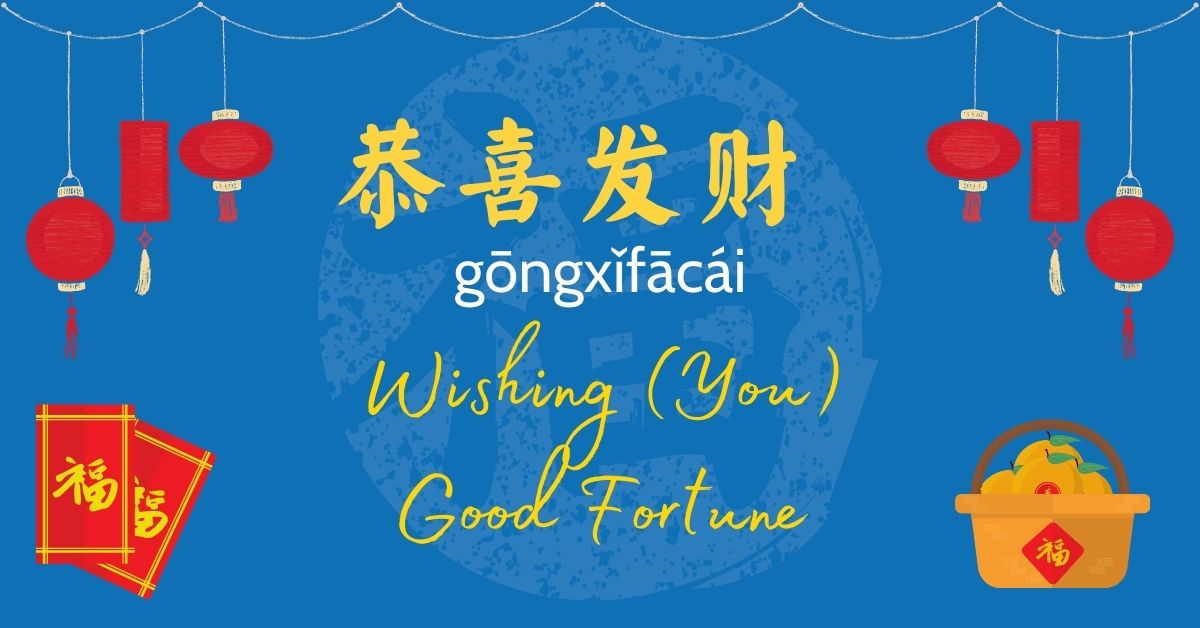
May all your wishes come true – 祝你心想事成 zhù nǐ xīnxiǎng-shìchéng
Now 心想事成 xīnxiǎng-shìchéng is actually a Chinese proverb, so it doesn’t have to strictly be kept for Chinese New Year.
Another appropriate time to wish someone this could also be on their birthday for example.
May you have abundance year after year – 年年有余 niánniányǒuyú
This is another very popular greeting/toast that you’ll hear around Chinese New Year. 余 yú means surplus or abundance it also has the same sound as 鱼 yú (fish), which makes fish a very lucky food in Chinese culture.
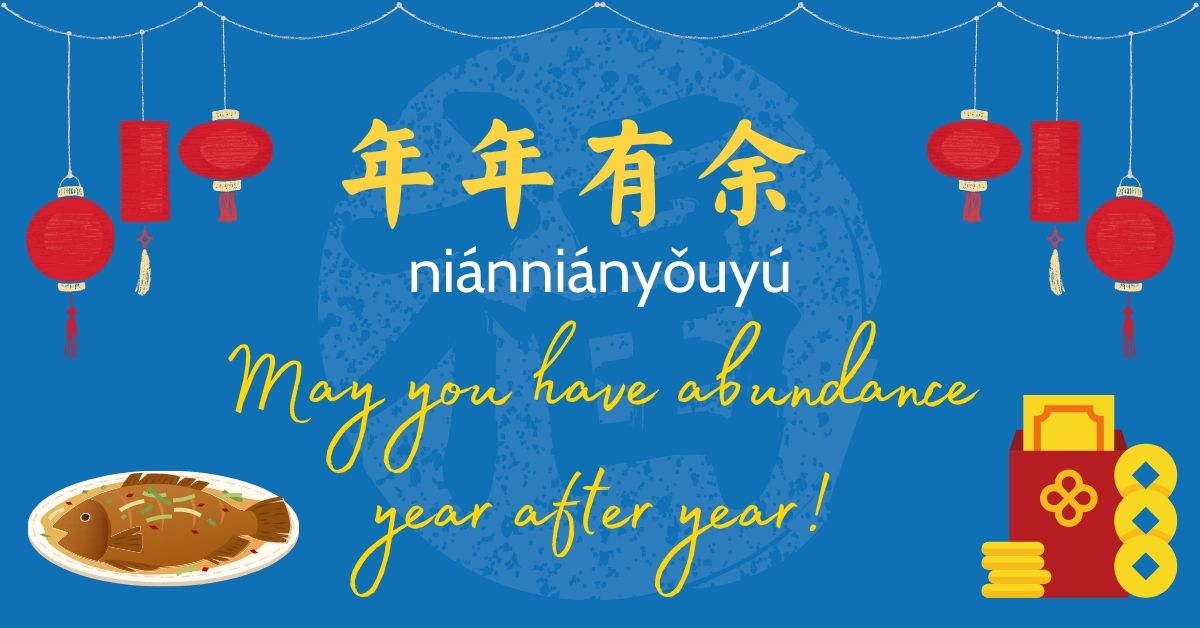
Wishing (You) Good Health – 敬祝身体健康 jìng zhù shēntǐ jiànkāng
Perhaps an especially important phrase to be wishing someone given the situation with the virus over the course of 2020.
敬祝 jìng zhù means to wish, 身体 shēntǐ means health or body and 健康 jiànkāng means health.
Good Luck in the Year of the Tiger – 虎年大吉 hǔ nián dàjí
For 2022 the Chinese zodiac will be the year of the Tiger, so you can specifically wish someone good luck for the coming year.
For other years, you can simply replace 虎 hǔ with the Chinese zodiac animal for that year.
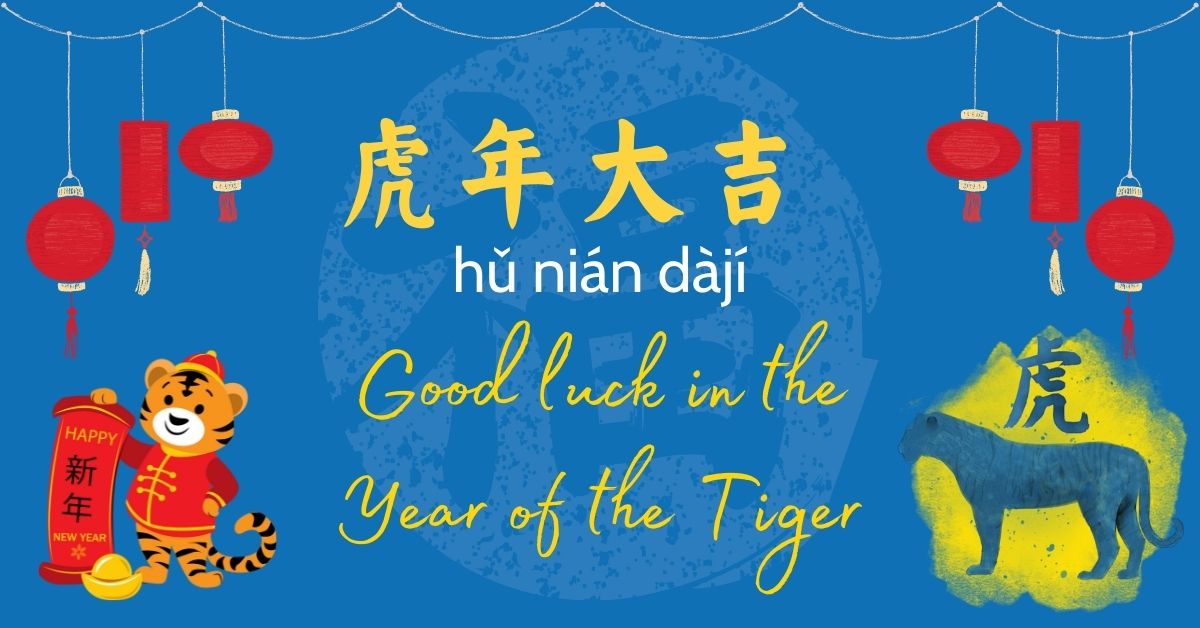
Everlasting peace year after year – 岁岁平安 suìsuì-píng’ān
Lastly we have the simple blessing to wish someone peace 平安 píng’ān year after year.
It’s important to remember that 岁岁 suìsuì only refers to year after year in this idiom and can’t be used on it’s own to mean yearly.
Chinese New Year Vocab || Activities, Objects and Decorations
Along with important dates and New Year greetings there are of course lots of other activities and objects that are a vital part of Chinese New Year.
You might already have heard of some of these Chinese traditions such as red envelopes (红包 hóngbāo) which have become such a part of everyday life you can send them on WeChat Pay and Alipay.
But are you as familiar with some of the other Chinese New Year activities and objects?
| English | Chinese | Pinyin |
|---|---|---|
| Red envelope | 红包 | hóngbāo |
| Money given to children as a Lunar New Year gift | 压岁钱 | yāsuìqián |
| Gifts | 礼物 | lǐwù |
| Fireworks | 烟花 | yānhuā |
| Firecrackers | 鞭炮 | biānpào |
| Set off firecrackers | 放鞭炮 | fàng biānpào |
| Lantern | 灯笼 | dēnglóng |
| Comedic skits | 小品 | xiǎopǐn |
| Cross-talk | 相声 | xiàngsheng |
| Acrobatics | 杂技 | zájì |
| Lion dance | 舞狮 | wǔshī |
| Dragon dance | 舞龙 | wǔ lóng |
| Zodiac | 生肖 | shēngxiào |
| Staying up until midnight/through the night | 守夜 | shǒuyè |
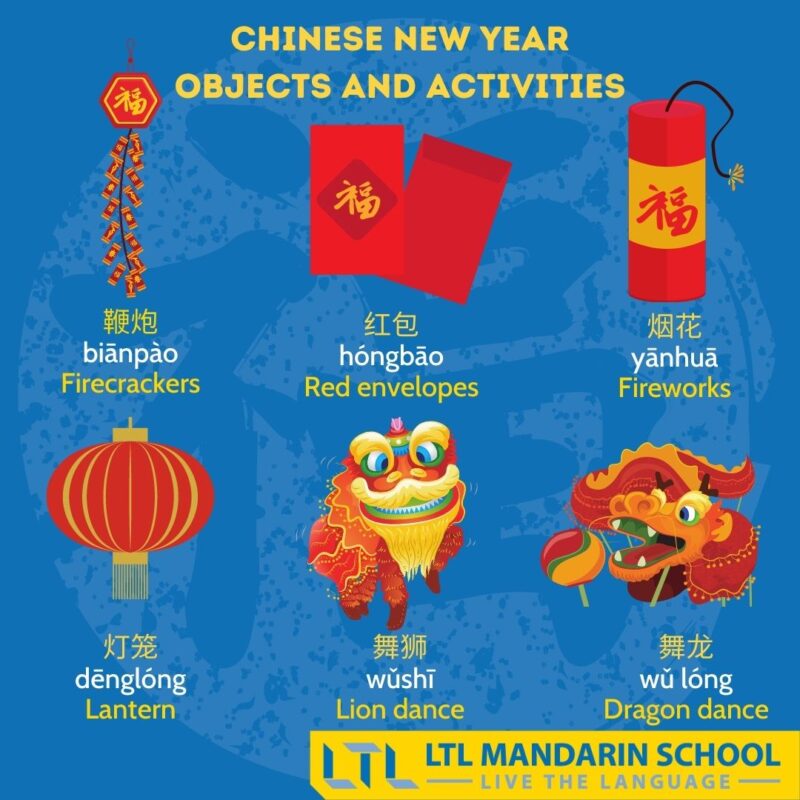
Anyone who has been in China or to a Chinese restaurant during the Spring Festival period will have seen some New Year decorations.
They traditionally decorate doorways to bring luck and festivity during the Lunar New Year.
Here are some of the most common decorations you’ll see:
- 春联 chūnlián – Spring Festival couplets, these are two lines of poetry written in gold or black characters on red paper. They are displayed vertically normally on a doorframe, sometimes there is also a horizontal top scroll.
- 福 fú – The character 福 (good fortune) will be seen everywhere during Chinese New Year. The most common decoration you’ll see is 福 in a red square diamond. Often this will be displayed upside down which symbolises that good fortune is coming.
- 窗花 chuānghuā – Paper cuttings, a traditional Chinese handicraft where red paper designs are cut out to stick on windows, doors etc. For Chinese New Year these will often display the Zodiac animal for that year along with an auspicious character such as 福 fú, 禄 lù, 寿 shòu.

Wedding Customs in China 👰- Exploring Beautiful Traditions
Wedding Customs in China – Your Complete Guide If you’ve been invited to a Chinese wedding or are perhaps just curious about wedding customs in China then we have the guide for you. Find out about Chinese wedding traditions along…
Chinese New Year Vocab || New Year Food
Anyone who is familiar with Chinese culture will know how important food is, with particular dishes being eaten for their symbolic meaning.
During important events like Chinese New Year or Chinese weddings there are some dishes which are a must.
Let’s have a look at some of the vocab for some of the most essential food eaten during Chinese New Year.
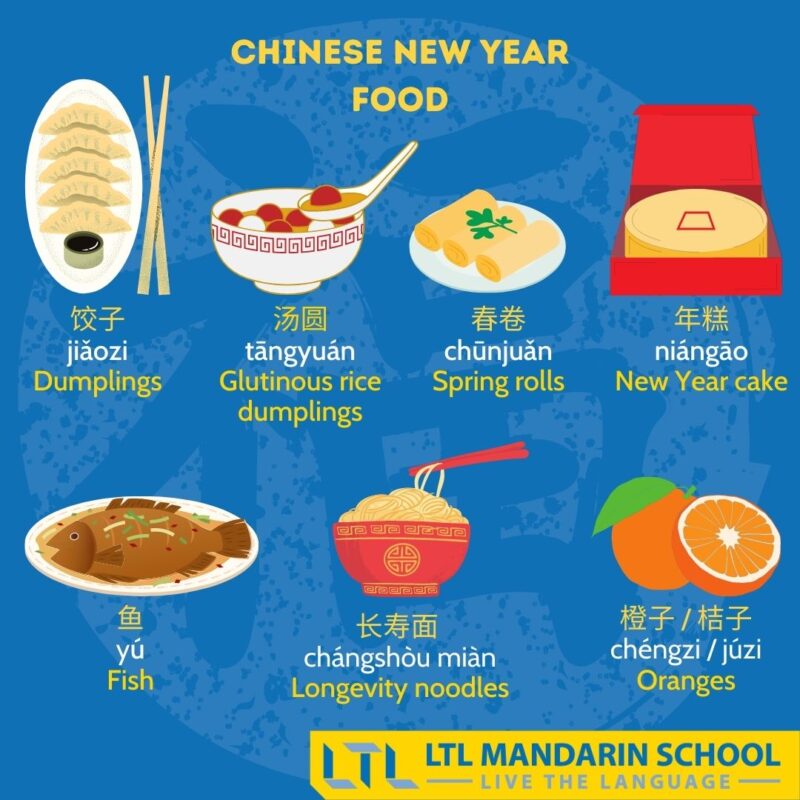
Dumplings | 饺子 jiǎozi
Dumplings or more specifically 饺子 jiǎozi are a classic lucky New Year food that are traditionally eaten on Chinese New Year’s Eve (除夕 chúxī).
Jiaozi can be made to look like Chinese gold and silver ingots that were used as money in ancient times.
According to legend the more dumplings you eat the richer you will become in the New Year.
Glutinous rice dumplings | 汤圆 tāngyuán
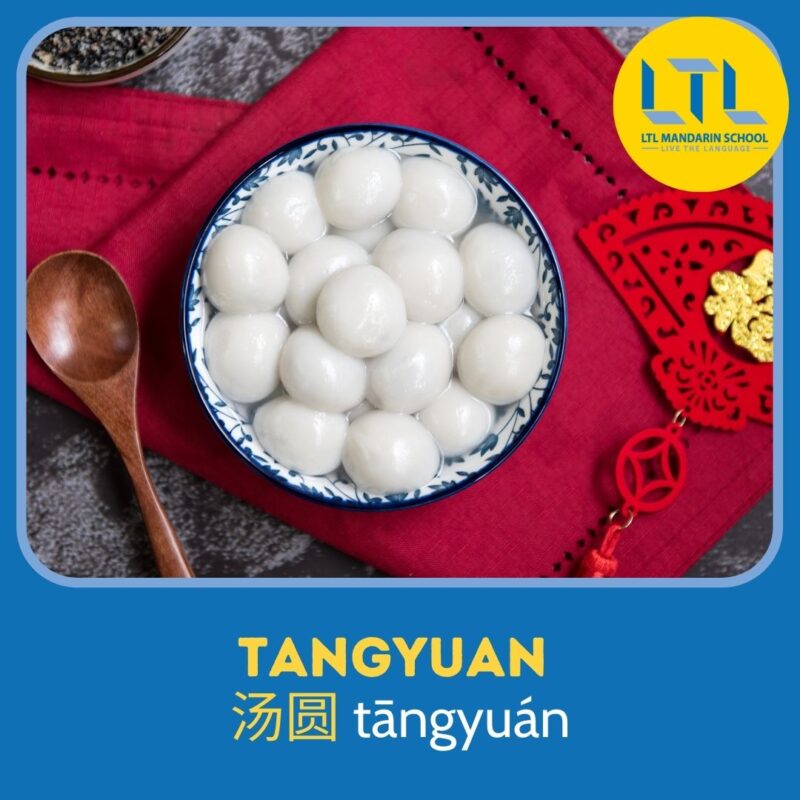
Next up we have another kind of dumpling that is popular to eat during Chinese New Year. Unlike jiaozi, it is the name of these dumplings that make them lucky, rather than their shape.
The 圆 yuán in their name is associated with reunion (团圆 tuányuán) and family togethreness.
These are most commonly eaten on the last day of Chinese New Year celebrations which is the Lantern Festival 元宵节 yuán xiāo jié.
Fish | 鱼 yú
We already mentioned earlier that fish in Chinese is seen as an auspicious food because it is a homonym for 余 yú meaning surplus.
This makes a fish dish an essential part of any Chinese New Year meal. Having fish every year symbolises the New Year blessing 年年有余 niánniányǒuyú.
鱼总是晚餐必不可少的,因为鱼象征着年年有余。Yú zǒng shì wǎncān bì bùkě shǎo de, yīnwèi yú xiàngzhēngzhe nián nián yǒuyú.
Fish is always part of the dinner because it represents abundance.
How the fish is served varies depending on where in China you are, some areas traditionally serve a whole fish where as in some cities such as Shanghai, it is traditional to have Shanghai smoked fish 上海熏鱼 shànghǎi xūn yú.
Spring rolls | 春卷 chūnjuǎn
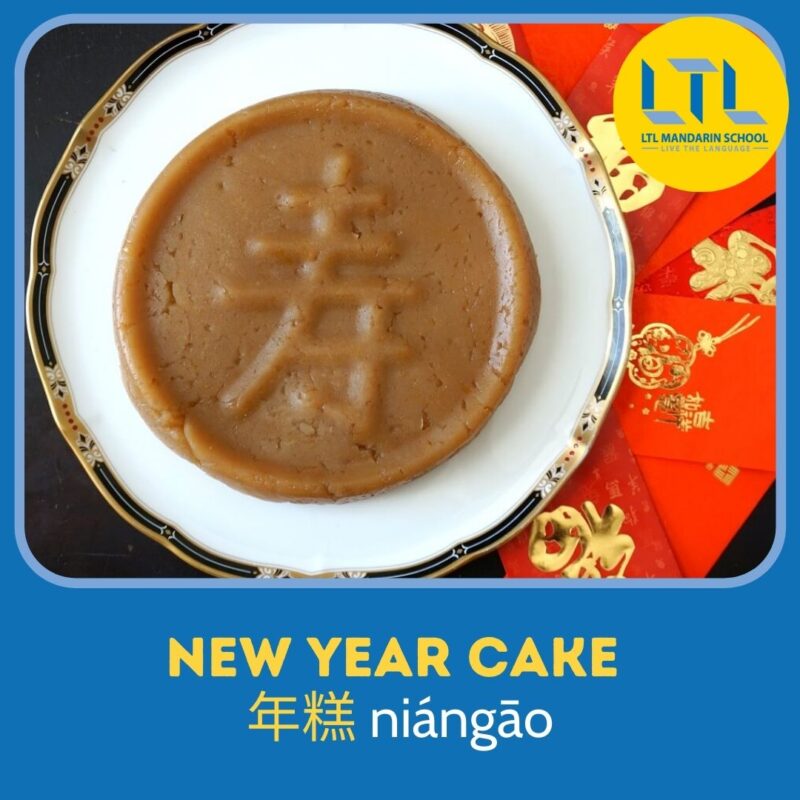
Although now eaten and enjoyed all year round, spring rolls were actually originally eaten during Spring Festival, which is actually where they got their name from.
These are a lucky food to eat during the Lunar New Year because they symbolise wealth as their appearance look similar to gold bars.
The lucky saying 黄金万两 is associated with eating them which means “a ton of gold”.
New Year cake | 年糕 niángāo
New Year cake is a glutinous rice cake that is normally eaten as part of the Chinese New Year’s Eve dinner.
This dish is considered auspicious because the name is a homonym for 年高 “higher year”.
Thus it is eaten to signify higher success in the coming year.
Longevity noodles | 长寿面 chángshòu miàn
Longevity noodles are commonly eaten either during Chinese New Year or on a person’s birthday. Originally they are made from one long, unbroken noodle strand and the longer the noodle the bigger the wish for long life. Nowadays they are normally a mixture of very long noodles, rather than just being one single strand.
Fruit | 水果 shuǐguǒ
Along with various dishes that are seen as lucky to eat at New Year, there are also certain fruits that are also considered to bring good luck.
The main ones are tangerines 桔子 júzi, oranges 橙子 chéngzi and pomelo 柚子 yòuzi.
This is again because of the sound or the look of the characters, 桔 jú contains the Chinese character for luck (吉 jí) and 橙 chéng sounds the same as 成 meaning success.
The 柚 yòu in pomelo sounds both like 有 yǒu (to have), and 又 yòu (again) so the more you eat the more wealth you will have.
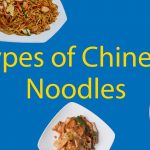
Types of Chinese Noodles 🍜 A Guide to 11 Varieties
There are many types of Chinese Noodle. Probably more than you think. So here’s our guide to the very best and the ones you have to try when in China.
Chinese New Year Vocab | Chinese Zodiac Animals
Lastly on our list of Chinese New Year vocab we have the 12 animals of the Chinese Zodiac. The year 2022 is going to be the Year of the Tiger 虎 hǔ.
| English | Chinese | Pinyin |
|---|---|---|
| Rat | 鼠 | shǔ |
| Ox | 牛 | niú |
| Tiger | 虎 | hǔ |
| Rabbit | 兔 | tù |
| Dragon | 龙 | lóng |
| Snake | 蛇 | shé |
| Horse | 马 | mǎ |
| Sheep | 羊 | yáng |
| Monkey | 猴 | hóu |
| Rooster | 鸡 | jī |
| Dog | 狗 | gǒu |
| Pig | 猪 | zhū |
The Chinese Zodiac begins with the Year of the Rat and then you can follow the order clockwise from the graphic below.
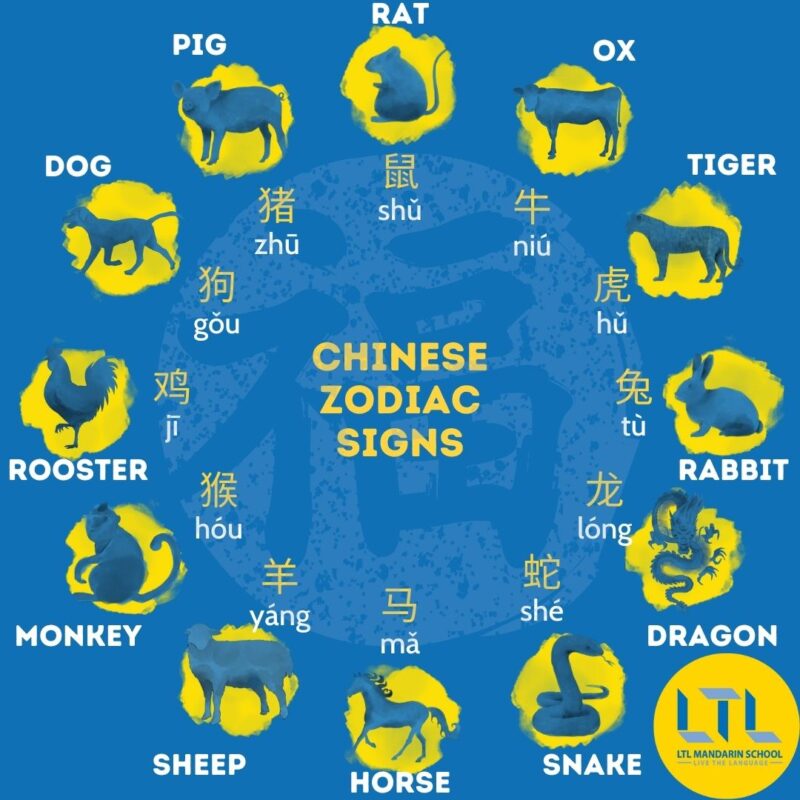
If you don’t know your Chinese Zodiac, then be sure to check out our Chinese Zodiac calculator!
Chinese Zodiac Posters
Chinese New Year Vocab // Quiz
Put your Chinese New Year vocab to the test with our quick quiz!
Chinese New Year Vocab | FAQs
How do you say Chinese New Year in Chinese?
Chinese New Year in Chinese is 春节 chūnjié which literally means Spring Festival.
How do you say Happy New Year in Chinese?
Happy New Year in Chinese is 春节快乐 chūnjié kuàilè which literally means Happy Spring Festival.
What was the Chinese zodiac animal in 2022?
The Chinese zodiac animal for 2022 was the Tiger.
What is the Chinese zodiac animal in 2023?
The Chinese zodiac animal for 2023 is the Rabbit.
What is the Chinese zodiac animal in 2024?
The Chinese zodiac animal for 2024 is the Dragon.
What is the Chinese zodiac animal in 2025?
The Chinese zodiac animal for 2025 is the Snake.
What day is Chinese New Year 2023?
Chinese New Year 2023 is the 22nd January.
Want more from LTL?
If you wish to hear more from LTL Mandarin School why not join our mailing list.
Sign up below and become part of our ever growing community.
WANT TO STUDY CHINESE FREE FOR A WEEK? Check out Flexi Classes and get 7 days for free.
We’ve got the best teachers, from the comfort of your own home!
BONUS | Want to learn Chinese in China? Check out our lessons in Beijing.
![[𝗢𝗟𝗗] LTL Beijing Logo](https://old.ltl-beijing.com/wp-content/uploads/logo-ltl-header.png)

 Hi, my name is Sabatino! I am from Italy and I am a Student Advisor at LTL. Fancy coming to study with us in China? Drop me a message.
Hi, my name is Sabatino! I am from Italy and I am a Student Advisor at LTL. Fancy coming to study with us in China? Drop me a message.
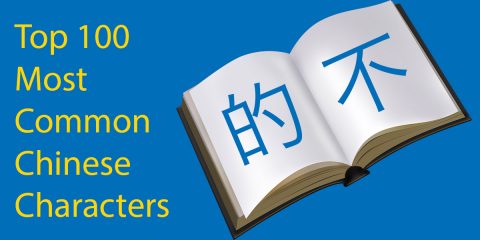

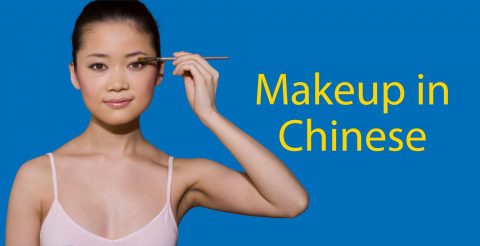
3 comments
[…] PSST – Want to learn more? Check out our post on the must know Chinese New Year Vocab here. […]
[…] Chinese New Year is the time of the largest migration in the world, when approximately 385 million people travel to visit their families. […]
[…] is a character you’ll see a lot especially during Chinese New Year due to its meaning. Words associated with positivity […]